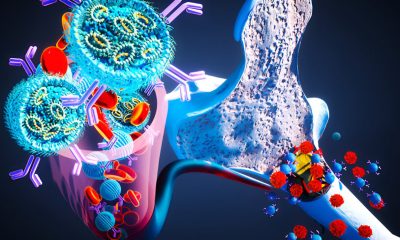Featured
Lifestyle, environmental factors contribute about 85% to causes of cancer — Nzelu
Published
10 years agoon
By
Olu Emmanuel
In this interview with CHIOMA OBINAGWAM, Dr. Abia Nzelu, the Executive Secretary of Committee Encouraging Corporate Philanthrophy (CECP) speaks on efforts to set-up Mobile Cancer Centers (MCCs) in the country, as well as preventive measures to the disease, among sundry issues.
WE are aware that the first set of Mobile Cancer Centers will be delivered towards the end of the first half of this year. What is the impact of this in your fight towards the prevention of cancer?
It is going to have a great impact in the cancer prevention. We are going to see a lot more people gaining awareness about the cancer scourge. With the presence of the Mobile Cancer Centers (MCCs), people will become more aware of what they should do to prevent the scourge as well as the signs and symptoms of cancer. The most important thing is that people should not wait for the signs and symptoms of cancer before they can call for medical attention because most cancers are treated in the early stages.
Apart from creating the awareness and the lifestyle modification that they need, people will have access to the infrastructure for screening and early treatment and that would lead to a dramatic reduction to the incidence and death rates in our country.
Do you mean that with the MCCs we will begin to see more of cancer screenings alone?
The MCCs have facilities for both screening and treatment. So, it is taking awareness to the grassroots, when they get there, they will be told what to do. They will have access to screenings and those that have early conditions can be treated at the MCCs but those who have more advanced stages will have to go to the Comprehensive Cancer Center.
Are you making plans to establish a Comprehensive Cancer Center in the country?
The treatment against cancer has two stages. The first stage, which is the short term goal, is to have these MCCs. It is better and you have quicker results. For you to have the Comprehensive Cancer Centers the cost is enormous but when you have this one, you will be able to reduce the number of cases.
The next stage is for you to have the Comprehensive Cancer Centers, at least one for each of the six geopolitical zones in the country because of the cost. At least we are targeting one for each of the geopolitical zones. So, it is holistic approach but it should be taken in phases.
How can a healthy lifestyle help in fighting against cancer?
Lifestyle and environmental factors contribute about 85 per cent to the causes of cancer. With modifying your lifestyle, one third of cancer can be prevented from occurring at all. Some of these lifestyles that we need to look at include exercise: exercise is very important.
Smoking contributes about 30 per cent of all cancers. Most people assume that when you talk about smoking, you talk about Lung cancer but it affects other cancers too including breast and cervical cancer. For cervical cancer, smoking is a big risk factor and people should not smoke and those that are smoking should stop.
The legislation that people should stop smoking in public places must be implemented to reduce the risk of other people dying from what they are not doing. For instance, you may claim you are not smoking but you are inhaling the smoke from the other person that is smoking.
A number of the risk factor for some of these cancers are sexually transmitted. Hepatitis, which I mentioned is a cause of liver cancer, can be transmitted through sex. Human Immunodefficiency Virus (HIV), which is also a risk factor for cervical cancer and some other cancers, can be transmitted through sex. If people are discipline, they will reduce the risk of these cancers.
However, whether you are slim or not, exercise is a very important factor. If you are very slim and you don’t exercise, your risk of cancer will be very high. When people adopt this healthy lifestyle they are going to reduce cancer and one-third of cancers can be prevented.
ALSO SEE: World Cancer Day: 7 facts you should know cancer
You talked about smoking but across the communities you find women that fry ‘akara’ (fried grounded beans) with firewood and I have seen that there are health consequences of the smoke they inhale. What damage does it do to them and the people around?
That is why when I talked about smoking. You are not just looking at the person smoking. You are talking about the environmental fumes as well. Recently, the International Agency for Research on Cancer stated that all air pollutants are risk factors for cancer and carcinogenic. If people can be made to start using more of gas, we are likely to reduce the health hazards that are related to cancer.
Is CECP only focused on fighting the cancer scourge?
CECP Nigeria is co-promoted by the core associations of the Organized Private Sector, namely: Institute of Directors (IoD), Lagos Chamber of Commerce and Industry (LCCI), Nigeria Employers Consultative Association (NECA), Nigerian Association of Chambers of Commerce, Industry, Mines and Agriculture (NACCIMA), Nigerian Institute of Management (NIM), and Nigerian Stock Exchange (NSE).
The first and current focal cause is the ‘Big War’ against cancer in Nigeria. This is designed to complement the effort of government by establishing the infrastructure for efficient and effective cancer prevention and treatment at the grassroots of Nigeria.
The short-term goal of the ‘Big War’ is to acquire and deploy MCC across the country. A MCC is not the same as a Mobile Mammogram. Rather, it is a clinic on wheels with state of the art facilities for screening, follow-up and treatment including surgeries for pre-cancerand early cancer cases. It also contains facilities for screening against ten cancer-related killer diseases, including hepatitis, diabetes, malaria, Human Immunodefficiency Virus/ Acquired Immuned Defficiency Syndrome (HIV/AIDS) and others.
Thus, the Mobile Cancer Centres would tackle the double burden of disease, i.e. communicable and non-communicable. CECP’s operational partner in the ‘Big War’ is the National Cancer Prevention Programme (NCPP), a non-governmental initiative, which pioneered community-based mass cervical cancer screening campaign in Nigeria.
This effort has contributed to a 15 per cent reduction of cervical cancer deaths in Nigeria, from 26 women dying daily to 22 daily, between 2008 and 2012 World Health Organisation (W.H.O.) Data. The significance of this modest improvement is underlined by the fact that the (W.H.O.) had projected a 25 per cent increase in cervical cancer deaths within ten years, in the absence of widespread intervention. The improvement in cervical cancer survivorship in Nigeria is proof positive that we can win the BIG WAR if we could scale up the effort. The MCCs is an important step in escalating this impact for the benefit of all Nigerians.
You may like


New prostate cancer cases to double by 2040 – Study


Rise in uterine cancer linked to pesticide exposure


Young people dying of cancer at ‘explosive’ rates, data shows


Breast cancer remains major cause of death among Nigerian women


Scientists develop RNA-based drug to destroy cancer cells in bone marrow


After spending millions, Nollywood actress dies of cancer
Trending

 Latest5 days ago
Latest5 days agoYoruba film industry mourns as popular actress aunty Ajara passes away

 Trends6 days ago
Trends6 days agoTonto Dikeh reunites son with Churchill after decade-long split

 Health1 week ago
Health1 week agoControversial preprint revives vaccine–autism debate, draws sharp pushback from medical experts

 Football1 week ago
Football1 week agoEPL: Confirmed transfer deadline day deals in January 2026

 Football1 week ago
Football1 week agoRonaldo’s future at Al Nassr in doubt as €50m release clause emerges

 Latest1 week ago
Latest1 week agoEx-Buhari Chief of Staff Gambari breaks silence on “Cabal,” body double rumours

 Health1 week ago
Health1 week agoExpert tips: Keeping snakes out of your home

 Latest1 week ago
Latest1 week agoTinubu’s diplomacy key to Nigeria’s economic recovery — APC

